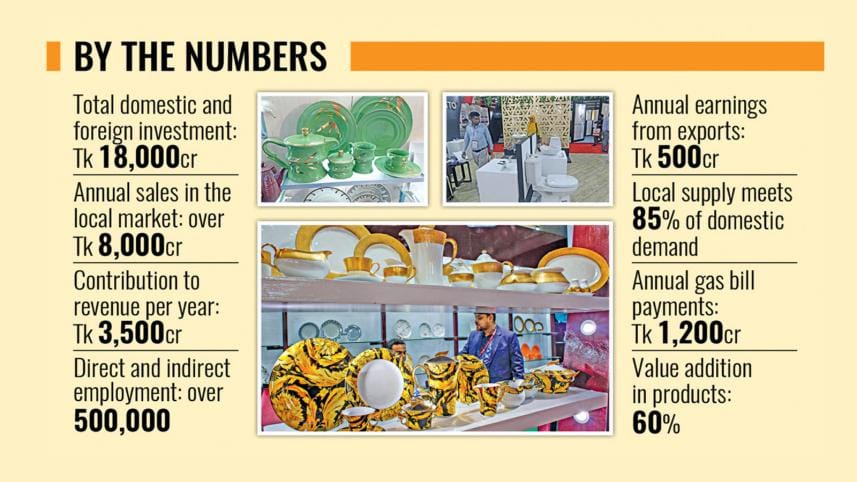Ceramics face double blow: gas crisis and tax burden

The country's ceramic industry is facing a severe crisis due to an ongoing gas shortage and the recent imposition of supplementary duty (SD) on the sale of ceramic tiles and sanitary ware, according to industry leaders.
"The government should ensure a stable gas supply," urged Moynul Islam, acting president of the Bangladesh Ceramic Manufacturers & Exporters Association (BCMEA), yesterday.
"…and withdraw the supplementary duty on ceramic tiles and sanitary ware to support the industry's continued growth during this crisis," he told a press conference at Dhaka Reporters Unity (DRU).
The BCMEA leader stated that the ongoing gas shortage and high production costs are major problems for the industry.
He called for urgent government intervention to recognise ceramics as a "priority industry," which they believe is essential for maintaining local production, retaining employment, and ensuring global competitiveness.
The ceramics sector, which generates Tk 500 crore in annual export earnings and provides employment to over 500,000 people, is struggling due to inconsistent gas supplies and escalating costs, he said.
In spite of ensuring a 150 percent growth in production and investment over the past decade, many manufacturers are now facing operational uncertainties, said Islam.
Islam said the ceramic industry has become a significant alternative to imports, saving approximately $2 billion annually for the local economy.
He added that more than 80 ceramic factories in Bangladesh are currently meeting 85 percent of domestic demand, while also generating substantial export revenue.
The BCMEA reported that the sector has attracted a total investment of Tk 18,000 crore, with ceramic manufacturers paying Tk 1,200 crore in gas bills annually.
However, ongoing gas shortages have severely impacted business operations, leaving many factories struggling to maintain production for the past year, it said.
The factories are in areas such as Dhaka (Mirpur, Savar, Islambagh, Dhamrai, and Kalampur), Narayanganj (Rupganj and Meghnaghat), Gazipur (Tongi, Kashimpur, Bhabanipur, Sripur, and Mawna), Narsingdi (Pachdona), and Mymensingh (Bhaluka and Trishal).
Instead of the required 15 pounds per square inch (PSI), gas pressure often drops to 2 PSI to 3 PSI or even reaches zero, causing daily production losses of over Tk 20 crore, said Islam.
Many ceramic companies have been forced to halt investment plans, while newly established factories remain non-operational due to the crisis, he said.
"This not only restricts business expansion but also limits job opportunities for thousands of workers," Islam stated.
The BCMEA also raised concerns over the continuous increase in gas prices, which has significantly driven up production costs.
Between 2015 and 2023, industrial gas prices surged by 345 percent, including by 150 percent in 2023 alone, it said.
This has led to an 18 percent to 20 percent increase in production costs, making it increasingly difficult for local manufacturers to compete with imported products, it said.
Islam cited that recent reports indicate the government is considering another 152 percent gas price hike, which would further inflate production costs by 30 percent to 35 percent.
"This would not only impact the ceramic industry but also raise transportation and operational expenses, ultimately affecting end consumers," he stated.
The BCMEA called on the government to reconsider the proposed price hike to safeguard the sector's competitiveness in local and global markets.
Another pressing demand from the BCMEA was for the withdrawal of the supplementary duty (SD) on the sale of ceramic tiles and sanitary ware.
Currently, a 15 percent SD is imposed on the sale of ceramic tiles, while sanitary ware faces a 10 percent duty.
Mir Nasir Hossain, former president of the Federation of Bangladesh Chambers of Commerce and Industry (FBCCI) and adviser to the BCMEA, emphasised the importance of uninterrupted gas supply for ceramic production.
"Gas is a crucial component in ceramic manufacturing, requiring a continuous 24-hour supply at a specific pressure level. Any drop in pressure can cause immediate damage to products, leading to substantial financial losses," he said.
Hossain warned that ongoing production disruptions could push manufacturers into financial distress, making them prone to becoming bank defaulters due to high interest rates.
Some companies are already on the path of collapse due to the gas shortages, he claimed, adding that despite the inadequate gas supply, factories are still required to pay the same utility bills.
Md Mamunur Rashid, vice president of the BCMEA, criticised the proposed gas price increase for new factories, with the rates being increased from Tk 30 per unit to Tk 75 per unit.
"This decision is completely illogical and would act as a major barrier to the industry's development," he said.
Regarding the SD, Rashid pointed out that the effective corporate tax rate on ceramic manufacturers reaches around 32.5 percent.
"We strongly urge the government to withdraw the proposal for imposing a 20 percent SD on the ceramic sector to ensure its sustainability and growth," he concluded.



 For all latest news, follow The Daily Star's Google News channel.
For all latest news, follow The Daily Star's Google News channel.
Comments